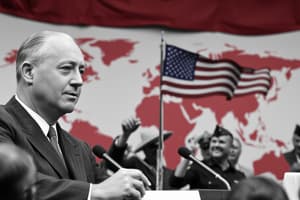Podcast
Questions and Answers
What were the Neutrality Acts intended to do?
What were the Neutrality Acts intended to do?
- Limit U.S. involvement in future wars (correct)
- Strengthen alliances with the Allies
- Encourage international trade
- Increase U.S. military presence abroad
What was the purpose of the Atlantic Charter?
What was the purpose of the Atlantic Charter?
To define the Allied goals for the post-war world.
What was the Truman Doctrine?
What was the Truman Doctrine?
An American foreign policy to counter Soviet geopolitical expansion.
Which term describes a foreign policy that limits international involvement?
Which term describes a foreign policy that limits international involvement?
What was the Good Neighbor Policy?
What was the Good Neighbor Policy?
What does cash-and-carry refer to in the context of U.S. foreign policy?
What does cash-and-carry refer to in the context of U.S. foreign policy?
What was the purpose of the Washington Naval Conference?
What was the purpose of the Washington Naval Conference?
What event does the Pearl Harbor attack refer to?
What event does the Pearl Harbor attack refer to?
What was D-Day/Operation Overlord?
What was D-Day/Operation Overlord?
Who was Joseph McCarthy?
Who was Joseph McCarthy?
What role did George C. Marshall play in U.S. history?
What role did George C. Marshall play in U.S. history?
What was Alger Hiss accused of?
What was Alger Hiss accused of?
Who was Joseph Stalin?
Who was Joseph Stalin?
Who were Julius and Ethel Rosenberg?
Who were Julius and Ethel Rosenberg?
What were War Relocation Camps?
What were War Relocation Camps?
What was the significance of the Battle of Midway?
What was the significance of the Battle of Midway?
Flashcards are hidden until you start studying
Study Notes
Neutrality Acts
- Laws enacted in 1935, 1936, 1937, and 1939 aimed at limiting U.S. involvement in future wars.
- Originated from public disillusionment with World War I, believing U.S. entry was due to loans and trade with Allies.
Atlantic Charter
- Issued on August 14, 1941, as a significant policy statement during World War II.
- Established Allied goals for the post-war world, outlining principles for peace and cooperation.
Truman Doctrine
- Announced by President Harry S. Truman on March 12, 1947, as a foreign policy initiative.
- Aimed to counter Soviet expansion during the Cold War by containing threats, particularly to Greece and Turkey.
Isolationism
- A foreign policy approach advocating minimal involvement in international affairs.
- Motivated by the desire to avoid involvement in conflicts and reassess international commitments, such as trade agreements.
Good Neighbor Policy
- Aimed at fostering positive relations between the U.S. and Latin America under President Franklin Roosevelt.
- Promoted reciprocal exchanges and emphasized a non-interventionist stance in Latin American affairs.
Cash-and-Carry
- Refers to a system established during World War II allowing countries to purchase goods from the U.S. if they paid in cash and transported them on their own ships.
Washington Naval Conference
- First arms control conference held in the U.S., attended by nine nations, including the U.S., Japan, and Britain.
- Focused on naval disarmament and Pacific interests; omitted Soviet Russia from participation.
Pearl Harbor Attack
- A surprise military strike by Imperial Japan on December 7, 1941, targeting the U.S. naval base at Pearl Harbor, Hawaii.
- Led to the U.S. officially entering World War II following the attack.
D-Day/Operation Overlord
- Major Allied invasion of German-occupied France on June 6, 1944, involving extensive planning for troop deployment and coordination.
- Increased scale aimed to capture strategic ports swiftly, particularly Cherbourg.
Joseph McCarthy
- U.S. Senator from Wisconsin from 1947 until his death in 1957, known for anti-communist activities.
- Rose to prominence during the Red Scare, promoting allegations of communist infiltration in the U.S. government.
George C. Marshall
- Prominent American statesman and military leader, serving as Chief of Staff of the U.S. Army and later as Secretary of State and Secretary of Defense under Truman.
- Key figure in post-war European recovery through the Marshall Plan.
Alger Hiss
- Accused of being a Soviet spy and convicted of perjury in 1950, creating significant controversy during the Cold War.
- His case exemplified the U.S. government's tension with alleged communist infiltrators.
Joseph Stalin
- Soviet revolutionary leader who governed, holding significant power as General Secretary from the mid-1920s until his death in 1953.
- Known for implementing extensive political and economic changes in the Soviet Union and influencing global communist movements.
Julius & Ethel Rosenberg
- Married couple executed for espionage, accused of passing atomic secrets to the Soviet Union.
- Their trial and execution heightened fears of Soviet espionage during the Cold War.
War Relocation Camps
- Over 110,000 Japanese Americans were forcibly relocated and interned during World War II due to fears of espionage and sabotage.
- Most internees were from the Pacific Coast and faced significant loss of property and civil liberties.
Battle of Midway
- A critical naval battle in the Pacific Theater from June 4 to 7, 1942, recognized for its strategic significance.
- The battle marked a turning point in the war, with U.S. forces decisively defeating the Japanese fleet.
Studying That Suits You
Use AI to generate personalized quizzes and flashcards to suit your learning preferences.



